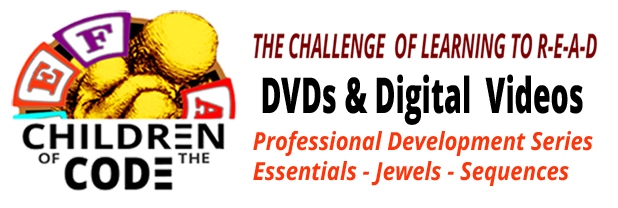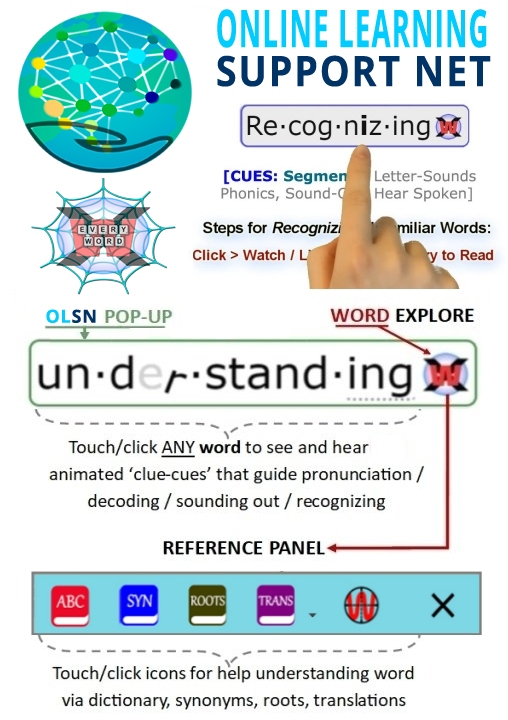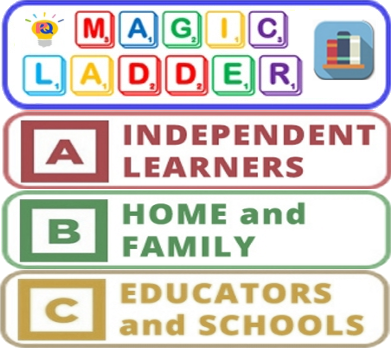Comprehension
Note: Remember to click on any word on this page to experience the next evolutionary step in technology supported reading.
Code Processing Inefficiency Drags Comprehension
Children who perform at the proficient level not only can understand the words that they’re reading and the paragraphs that they’re reading, in the sense of bringing to bear information from their own experience, other classes, reading, home and background to bear on what they’re reading; but they also read fluently. That means they’ve broken the code; they can turn letters into sounds at a level that doesn’t really require conscious processing anymore.
It’s like the child who has learned to ride a bicycle and really has learned to ride it. That child is not thinking about where her feet are on the pedals and how quickly she has to turn the pedals around and whether her hands are on the brake or not. That part of the process has been over learned and the child doesn’t even have to think about it anymore, and can now think about where the bicycle is going and why the trip is going to be taken and whether she should be going fast or slowly.
Children who have really broken the code have moved to fluency. The whole process of dealing with the code is now occupying a different section of the brain; it doesn’t require a lot of thought and allows them to go on and think about what they are exposed to, what they are reading, what’s written on the page and what it really means.
Grover (Russ) Whitehurst, Director, Institute of Education Sciences, U.S. Department of Education Source: COTC Interview –http://www.childrenofthecode.org/interviews/whitehurst.htm#CodeInefficiencyDrags
Word Recognition and Comprehension
Dr. Charles Perfetti: … I was just struck by the fact that kids who had trouble understanding what they read, if you looked at them closely, they had trouble reading words. They either took longer or sometimes we asked the teacher to identify kids having problems and she’d say ‘Well, this kid reads words just fine but he can’t understand what he reads.’ We’d say okay and we’d go test him and we’d find out that, well yes, if you weren’t looking really closely, if you had him read a list of words he would read most of the words accurately. But if you measured the time it was taking him or the difficulty he was having, you almost always found that there was some problem in word reading.
David Boulton: There’s still quite a confusion with that today. People say that the student seems to be able to decode words fine so that isn’t the problem. And yet on closer inspection it seems that the efficiency with which they’re decoding the word, recognizing the word, is definitely having an impact on the resources necessary for subsequent comprehension.
Dr. Charles Perfetti: That’s right and that was the heart of that argument back then. I think the argument has become fairly widely accepted as being a correct argument. I think we have a better understanding, although I continue to be disappointed that researchers don’t look hard at word level processing in this new area of research called specific comprehension deficits. That’s a phrase that has been coined by several researchers. The general idea is that they’re observing children who, in fact, are fine at word decoding and have as their only problem comprehension.
I think that hypothesis is correct. That is, the hypothesis that there are children who have as their main problem something else in the language system than reading words. But I am still a little disappointed when I look at how people look at word identification. So, I think what has happened is people took my argument seriously enough, and the argument of others, that they assess decoding now before they do a study on some other variable. But they still tend not to measure efficiency and speed.
David Boulton: Even the neuroscience hasn’t yet gotten to the point where they can isolate the timing of processes in the assembly processing between the code and the word recognition processes.
Dr. Charles Perfetti: Well yeah, I think that’s right.
Charles Perfetti, Professor, Psychology & Linguistics, University of Pittsburgh. Source: COTC Interview: http://www.childrenofthecode.org/interviews/perfetti.htm#WordRecognitionandComp
Comprehension to Decoding
Dr. Charles Perfetti: … There are now training studies you can point to that show that if you increase decoding word efficiency you get comprehension gains, I think one has to acknowledge that’s there’s likely to be a reciprocal relationship here. As you get so that you can comprehend what you read you are going to strengthen your word identification processes.
I mentioned the training studies because those do break through what are otherwise only correlations. That is, generally speaking, a correlation between word decoding and comprehension. You break through that in a training study by showing that if you improve someone’s word decoding you improve the comprehension. There are now a few studies that have shown that that can happen, although I am also impressed by the fact that it’s apparently not so easy to do. Some of the training studies do not work so well; it has to be done right and so on.
But I think that underlying this is an important idea that the reading system, which does depend very much on the spoken language system, its components can develop in tandem and can mutually reinforce each other. So, as you comprehend better I actually think you do get the experience of successful comprehension in strengthening word identification processes; at least on the words that you are reading while you are comprehending what you’re reading. Although I originally argued very strongly for this causal relation, and I still think that’s correct, I do think we need to understand that it’s a little unclear.
You don’t want to be in the position of saying that we have to reach some level of decoding skill before we can expect them to comprehend because that’s certainly not true. Comprehension is something that develops very quickly as children begin to read and I think the behaviors of reading, both reading out loud and silently, are calling on all parts of the system and can mutually support and can strengthen each other. That helps and partly explains why you tend to see a high correlation at some point. Basically, to put it crudely, the more you’ve read the more practice you have had at identifying words and the more practice you’ve had at comprehension. So, you see a positive correlation.
David Boulton: Right, which makes perfect sense in terms of comprehension making it easier for word recognition to ‘catch’ the approximations coming out of decoding-assembly processing such that they feed into one another and become a kind of iterative heuristic that becomes self-optimizing.
Charles Perfetti, Professor, Psychology & Linguistics, University of Pittsburgh. Source: COTC Interview: http://www.childrenofthecode.org/interviews/perfetti.htm#ReciprocalRelationship
The Matthew Effect
The Matthew Effect describes what happens over time when some children enter into a positive feedback loop, whereby those who learn to read and break the code with relative ease experience a positive affect and are able to read the text that they are given in schools with fluency. And that fluency develops a level of automaticity and because they develop automaticity with sounds and words they’re cognitive work space is freed to operate on the meaning of print, the purpose of why children are engaged in it. And so the world opens up to children who have that cognitive space left, who have automatized the code and words.
Anne Cunningham, Director of the Joint Doctoral Program in Special Education with the Graduate School of Education at the University of California-Berkeley. Source: COTC Interview: http://www.childrenofthecode.org/interviews/cunningham.htm#MatthewEffect
Ripple Effects of Reading Difficulty
I do see some very interesting ripple effects when kids are not acquiring reading skills. For example, it might be that a particular child in fourth grade is having difficulty keeping pace with reading comprehension or with decoding, and because he’s having trouble with reading, he hates to read. And when he does read, he gets almost nothing out of it because he’s reading very passively. And because he’s reading very passively, he’s not able to use reading as a way of building his language abilities.
So, what oddly happens is that his language problems caused his reading problems, and his reading problems are now causing much more aggravated language problems. Those language problems, in turn, are going to make it hard for him to follow directions, communicate well with other people, and even use language inside his mind for something called ‘verbal mediation.’ Verbal mediation is the process through with which you regulate your behavior and feelings by talking to yourself. And believe it or not, a lot of kids with language problems really don’t use language as a way of regulating themselves.
They get in trouble, they get depressed, because they don’t have a voice inside that says, ‘Yeah, I could take that medicine. I could take that drug from that kid, and hey I’m a cool dude. But oh, if I take it, I could like wreck my brain, and I could get addicted and my mother will kill me if she finds out, and I could get arrested.’ And all of that comes out of language, that sort of verbal conscience that’s guiding you.
So, if you go all the way back to the language problem and say, yeah, it’s causing a reading problem, and the reading problem is causing the language problem, and the language problem is causing a behavior problem, and the fact that this kid can’t read, and other people around him can read much better is eroding his self-esteem, making him feel pretty worthless.
Mel Levine, Professor of Pediatrics; Co-founder, All Kinds of Minds Institute; Director, University of North Carolina Clinical Center for the Study of Development and Learning; Author, A Mind at a Time, The Myth of Laziness and Ready or Not, Here Life Comes. Source: COTC Interview: http://www.childrenofthecode.org/interviews/levine.htm#NegativeCollateralEffects
Code Processing and Comprehension
David Boulton: I noticed that you mentioned that you infer comprehension from part three of DIBELS…
Dr. Edward Kame’enui: Or reading fluency.
David Boulton: Based on the rate that they’re moving through text because that implies that they’re processing efficiency/ecologyis up to a certain level, it’s not consuming brain bandwidth, it’s now easier for them to comprehend.
Dr. Edward Kame’enui: That’s my assumption, exactly.
David Boulton: Some argue that there’s a lot of kids that are reading words very clearly, without errors, and have a great word stream, yet they still don’t understanding anything.
Dr. Edward Kame’enui: I don’t know about a lot of kids.
David Boulton: I have heard forty percent or something in that neighborhood…
Dr . Edward Kame’enui: Oh, I don’t…
David Boulton: But my sense is the biggest impedance to comprehension is right here where you’ve put your finger.
Dr. Edward Kame’enui: Absolutely.
David Boulton: That it’s the poor ecology/efficiency of the underlying processing that’s dragging the processing resources down that are necessary for reflective comprehension…
Dr. Edward Kame’enui: That’s right.
David Boulton: Not subsequent to that.
Dr. Edward Kame’enui: Well, you can’t comprehend words if you can’t read the words. You got to first read the words.
David Boulton: Sure. But the argument is, at least in this case, you’ve got kids that are reading the words fine, but they’re still not getting it.
Dr. Edward Kame’enui: Absolutely. That’s a different problem.
David Boulton: I’m asking in the spectrum of things…
Dr. Edward Kame’enui: That’s a small problem. Those are hyperlexic kids. Those are kids that somehow get access to the code, but can’t comprehend and don’t have the semantic experience with words to make connection to the…
David Boulton: They can’t go meta and implicate it all into something they can understand.
Dr. Edward Kame’enui: Exactly, exactly. But those kids are very, very few. I mean, on a population basis, I’d be surprised if it’s one percent.
Edward Kame’enui, Past-Commissioner for Special Education Research where he leads the National Center for Special Education Research
under the Institute of Education Sciences. Source: COTC Interview – http://www.childrenofthecode.org/interviews/kameenui.htm#CodeProcessingandComprehension
Comprehension
Nanci Bell: Then I finally realized that being able to sound out a word, being able to remember it, and then being able to read it in context, that clearly is what you have to do to do what we call decode. But those are only part of it, because what Pat and I were also frustrated with was that not only were we wanting to get more gains than word attack skills, we wanted to improve it across the board. We were also extremely frustrated with the students that came to us, and there weren’t very many, David, but the students that came to us, that we could develop their ability to read, but then they still couldn’t comprehend.
David Boulton: Yes. When you said they developed the ability to read…
Nanci Bell: Words.
David Boulton: Yes.
Nanci Bell: They could read words, but it didn’t do them any good, because they couldn’t comprehend. And there’s a term for that, as you probably know, if it’s really severe it’s called hyperlexia instead of dyslexia.
But the students that we were seeing may not have been severe enough to be called hyperlexic, it’s just that they could get a little bit of what they read, but they couldn’t get all of it. And so I began to think, as Pat did, about what did she do when she was reading a word, when she realized she could hear the sound and feel the sounds in her mouth, if she checked her mouth to verify a sound. I realized that when I read I was making images, that every book that I’d ever read — I was a girl that lived out in the country, I didn’t have any brothers and sisters, and I spent a lot of time with horses, and I read a lot of horse books — that I visualized every bit of them.
Pat Lindamood and Nanci Bell, Founders, Lindamood-Bell Learning Processes. Source: COTC Interview – http://www.childrenofthecode.org/interviews/lindamoodbell.htm#Comprehension
Code Work and Comprehension
Dr. Keith Rayner: Exactly. Yes. Incidentally, another thing I did do there was I took third graders and gave them text which was appropriate for them, and then they’ve got sort of a normal looking window. But then if I gave them text that was too hard, then the window shrinks.
David Boulton: Yes.
Dr. Keith Rayner: It’s very small, because they’re spending so much effort in decoding the fixated word that they don’t get more use from the information further away.
David Boulton: Yes. That makes perfect sense.
Dr. Keith Rayner: There are also experiments done with skilled readers, that were done by students in our lab, where they showed that if what you’re looking at is hard to process, then the span of perception shrinks down again, gets small, because, again, you’re devoting all of your resources to figuring out what this word is that you’re looking at.
David Boulton: That indirectly shows the relationship between the code work and comprehension, yes?
Dr. Keith Rayner: Yes.
Keith Rayner, Distinguished Professor with the Psychology Department, University of Massachusetts; Director of the University’s Eyetracking Laboratory. Source: COTC Interview – http://www.childrenofthecode.org/interviews/rayner.htm#InverselyRelatedtoDifficulty













